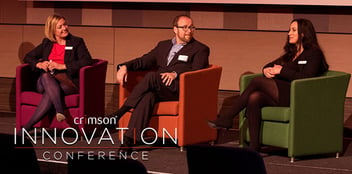Innovating IT Through First Principles Thinking
At Crimson’s Innovation Conference, back in April this year, we continued our pursuit of smart ideas that can drive forward innovation and disruption. We were blessed to welcome Georg Ell, Tesla’s Head of Europe, to share Tesla’s ways of working that are ripping up the rulebook in the automotive and energy sector. It was especially fitting that the day they presented Tesla’s stock valuation had overtaken Ford. But here's something Georg didn't share with the audience...
Clearly technology remains central to how business moves into and through the Fourth Industrial Revolution.A major responsibility therefore rests on the CIO to lead the change. Innovation, by the way, that is necessary if organisations are not to fall foul of a wave of disruption that many cited as coming within the next five years, according to a 2016 YouGov poll of UK business leaders.
Two barriers facing us are, first, breaking free from the paradigm we’re thinking within in today and, second, bringing the organisation with us on the journey.And it’s the first challenge I wanted to consider today.
A concept that has cropped up a few of times while researching this blog post was first principles thinking. It seems particularly popular among disruptive start-ups and is featured in an Elon Musk interview. I’ll let Elon explain:
I think it is important to reason from first principles rather than by analogy. The normal way we conduct our lives is we reason by analogy. [When reasoning by analogy] we are doing this because it’s like something else that was done or it is like what other people are doing — slight iterations on a theme.
First principles is kind of a physics way of looking at the world. You boil things down to the most fundamental truths and say, “What are we sure is true?” … and then reason up from there.
Somebody could say, “Battery packs are really expensive and that’s just the way they will always be… Historically, it has cost $600 per kilowatt hour. It’s not going to be much better than that in the future.
"With first principles, you say, “What are the material constituents of the batteries? What is the stock market value of the material constituents?”
It’s got cobalt, nickel, aluminum, carbon, some polymers for separation and a seal can. Break that down on a material basis and say, “If we bought that on the London Metal Exchange what would each of those things cost?”It’s like $80 per kilowatt hour.
So clearly you just need to think of clever ways to take those materials and combine them into the shape of a battery cell and you can have batteries that are much, much cheaper than anyone realises.”
—Elon Musk
Reasoning by first principles turns out to be one of the best ways to develop mental models that are rare and useful. By forcing yourself to look at the fundamental facts of a situation you can develop your own perspective on how to solve problems rather than framing them in the way the rest of the world or your market already sees them.
A recent debate on LinkedIn discussed whether a typical CIO’s personality (deemed generally introspective) is suited to the demands of digital and working innovatively within teams. It strikes me that first principle thinking comes from the world of science and logic – two areas that many CIOs lean towards and that, I believe, can contribute to in spades.Crimson helps UK organisations run, grow and innovate.
We run a number of shaping workshops that can quickly establish the business case. And because we start small with IT, we can achieve quick wins that help you move forward with confidence. If you’re looking to innovate, understand what others are doing and want to know how to move forward at minimal risk, I encourage you to contact the team today to book an obligation-free appraisal session.


